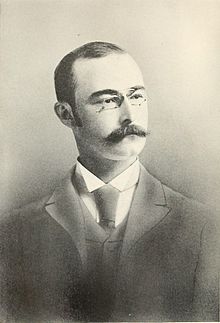Narciso Gener Gonzales
| Narciso Gonzales | |
|---|---|
 |
|
| Born |
August 5, 1858 Edisto Island, South Carolina |
| Died | January 19, 1903 (aged 44) Columbia, South Carolina |
| Nationality | American |
| Occupation | Newspaper editor |
Narciso Gener Gonzales (August 5, 1858 – January 19, 1903) was born in Eddingsville, Edisto Island, South Carolina. He and his brother, Ambrose E. Gonzales, were the founders of The State newspaper in the state capital, Columbia.
Gonzales was the son of Colonel (CSA) Ambrosio José Gonzales and Harriet Rutledge Elliott. His father was a Colonel in the Confederate Army who played an instrumental role in the defenses of South Carolina during the American Civil War. Prior to this his father was a Cuban revolutionary leader with Venezuelan general Narciso Lopez, who opposed oppressive Spanish rule in four failed expeditions. His mother was the daughter of the wealthy South Carolina rice planter, state senator and writer, William Elliott.
Although his formal education ended at the age of seventeen, Narciso Gonzales became a telegraph operator in 1875 in order to help support his extended family. He worked in railroad depots in Varnville, South Carolina, Savannah, Georgia, and Valdosta, Georgia. While working as a telegrapher and handling news reports, he developed an interest in journalism and state politics. In 1880, he left the telegraph office in Valdosta to become a reporter for the Greenville, South Carolina, Daily News.
While working in Varnville in 1876, Narciso Gonzales had written a report on a local uprising of plantation workers and telegraphed it to the Charleston, South Carolina, Journal of Commerce. This came to the attention of the editors of a rival newspaper, the Charleston News and Courier. Shortly after going to work for the Greenville Daily News, Gonzales accepted a position as the Columbia, South Carolina correspondent for the News and Courier.
In 1891, Narciso Gonzales and his brother Ambrose E. Gonzales (1857–1926) founded The State newspaper in Columbia, South Carolina. The paper supported a number of progressive causes; its editorials called for an end to lynching, reform of child labor laws, and women's suffrage. The paper was also frequently critical of the policies of Benjamin R. Tillman, who had been elected governor of South Carolina in 1890.
...
Wikipedia
